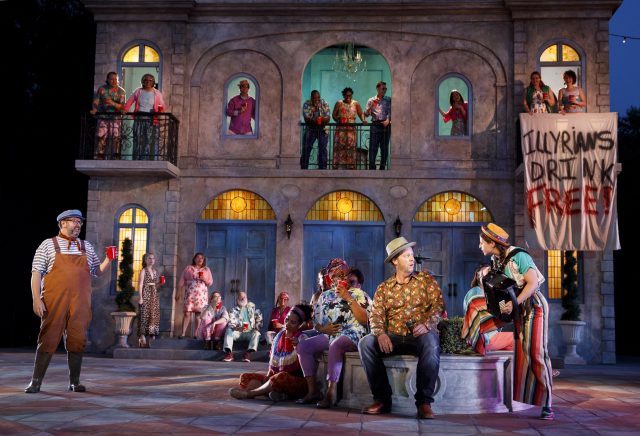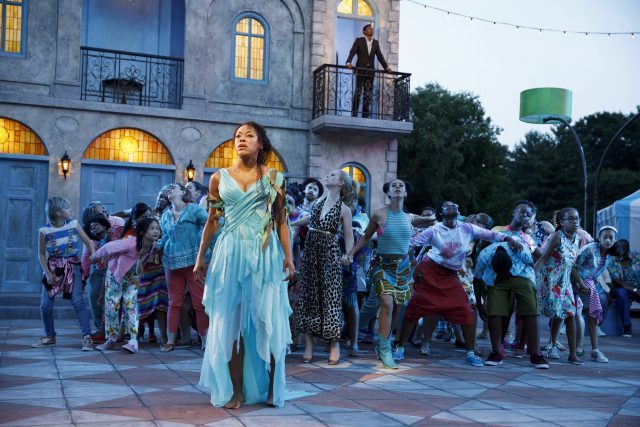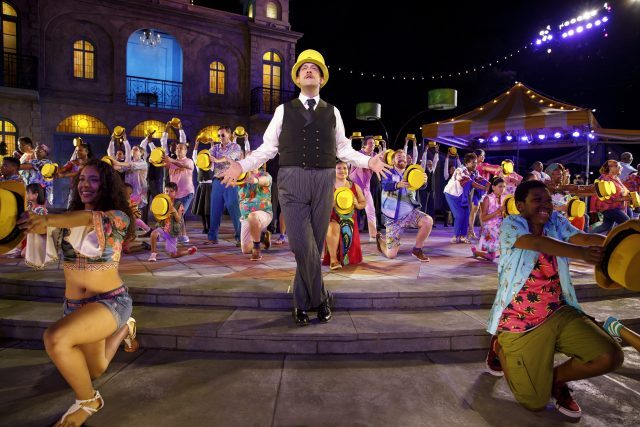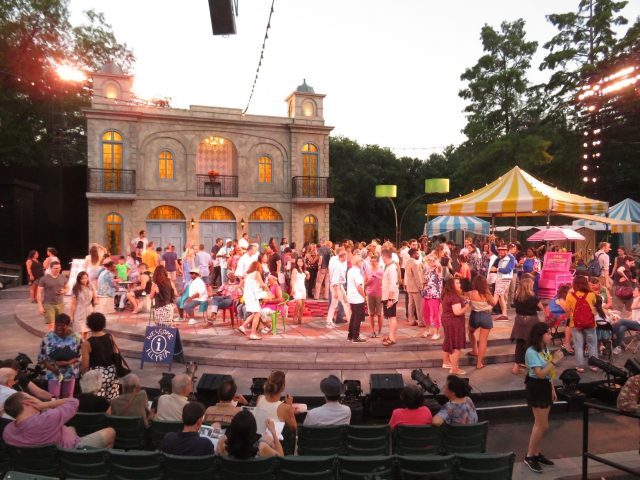
Sir Toby Belch (Shuler Hensley) and Feste (Shaina Taub) argue over who is the worst in Twelfth Night at the Delacorte (photo by Joan Marcus)
Central Park
Delacorte Theater
Tuesday-Sunday through August 19, free, 8:00
shakespeareinthepark.org
“Shall we set about some revels?” Sir Toby Belch asks in Twelfth Night. “I do delight in masques and revels, sometimes altogether,” responds Sir Andrew Aguecheek. There is much to revel in at the Public Works presentation of William Shakespeare’s 1601-2 comic romance, continuing at the Public Theater’s Delacorte through August 19. Since 2013, the annual Shakespeare in the Park summer festival has concluded with a musical version of a classic tale, performed over Labor Day weekend following the two main productions. Adapted by either Todd Almond (The Tempest, The Odyssey) or Shaina Taub (The Winter’s Tale, As You Like It with Laurie Woolery) and under the leadership of Public Works founder and director Lear deBessonet, the shows feature top-tier actors (Laura Benanti, Christopher Fitzgerald, Lindsay Mendez, Brandon Victor Dixon, Norm Lewis) joined by some two hundred men, women, and children from community organizations across all five boroughs. In 2016, Taub staged Twelfth Night, which is now back for an ecstatic full run in Central Park, spreading Joe Papp’s belief that theater is for all people. This production is totally committed to that vision; before the show starts, the entire audience is encouraged to hang out onstage and interact with members of the enormous cast and crew, playing checkers and other games, sitting for caricature sketches, eating free popcorn, singing with a small band, and posing for pictures in front of the set. (Yes, that man handing out glow sticks is Shuler Hensley, the Tony-winning star of Young Frankenstein, Les Misérables, and Oklahoma!)

Viola (Nikki M. James) and Duke Orsino (Ato Blankson-Wood) are desperate for love in musical adaptation of Shakespeare play (photo by Joan Marcus)
The ninety-minute show is a pure delight. After a shipwreck in which she believes her twin brother, Sebastian (Troy Anthony), must have been killed, Viola (Tony winner Nikki M. James) winds up in Illyria, where the grief-stricken Countess Olivia (Nanya-Akuki Goodrich) is mourning the loss of her own brother. Disguising herself as a man named Cesario, Viola gets a job working for the lovesick Duke Orsino (Ato Blankson-Wood), who has the hots for Olivia, but she wants no part of him. In fact, Olivia is attracted to Cesario, while Viola has fallen for Orsino. The absurdly proper steward Malvolio (Andrew Kober) is also in love with his ladyship, Olivia. Through it all, Olivia’s uncle, the drunken wastrel Sir Toby Belch (Hensley), and his bestie, Sir Andrew Aguecheek (Daniel Hall), flit about Illyria, getting drunk, making jokes, and causing trouble, including teaming up with Olivia’s gentlewoman, Maria (Lori Brown-Niang), to pull off a rather mean-spirited prank. As Sebastian and his friend, Antonio (Jonathan Jordan), enter Illyria, the mistaken identity, screwball love triangles, and general mayhem ratchet way up.

Malvolio (Andrew Kober) brings down the house with some vaudevillian shtick in Public Works presentation in Central Park (photo by Joan Marcus)
In addition to writing the music and lyrics for the show, which she conceived with Kwame Kwei-Armah (the new artistic director of the Young Vic), the Vermont-raised, New York City–based Taub (Old Hats; Natasha, Pierre & the Great Comet of 1812) introduces it, portrays Feste the fool, and leads the band at her piano. She’s sort of like a sprite, prancing about with her accordion; even when she accidentally tripped, she declared her instrument fine and continued the scene in excellent form, wearing a huge smile. The songs not only propel the plot and deepen character development but also relate wonderfully to Shakespeare’s language; the opening number is “Play On” (“If music be the food of love, play on!”), and Kober has a blast chewing up the showstoppers “Count Malvolio” (“I could be Count Malvolio! / Lord of the estate / Dressed in all the finest silk and master of my fate / I’d summon all my minions in a most majestic tone / Then once they all arrived / I’d tell them, ‘Leave me alone!’”) and “Greatness” (“If some are born great / And some achieve greatness / And some have greatness thrust upon them / Then I can’t help that I was born great! / I didn’t ask to be the best / Things would be much easier being average like the rest”). Feste kicks off “You’re the Worst,” in which Fabian (Patrick J. O’Hare), Sir Andrew, Sir Toby, and Feste roast one another (“You try too sincerely to please every crowd / You play the accordion, for crying out loud! / So let me tell you first / That you are the worst!”) before ganging up on poor Malvolio. The score also features “If You Were My Beloved,” “Is This Not Love?” and “Word on the Street,” as Taub and her band go from New Orleans jazz and pop to R&B and hip-hop.

The audience is encouraged to mingle with cast and crew and play onstage before show (photo by twi-ny/mdr)
For Twelfth Night, the Public has partnered with Brownsville Recreation Center, Casita Maria Center for Arts and Education, Center for Family Life in Sunset Park, DreamYard Project, Fortune Society, Military Resilience Project, Children’s Aid Society, and Domestic Workers United, with cameos from people from COBU, Jambalaya Brass Band, the Love Show, New York Deaf Theatre, Ziranmen Kungfu Wushu Training Center, and even the US Post Office. Every participant, regardless of theatrical experience, is given equal billing both on the official poster and in the Playbill. Public Theater artistic director Oskar Eustis has taken the helm from Kwei-Armah, directing the rather large cast on Rachel Hauck’s welcoming, carnivalesque set, which is backed by the facade of Olivia and Orsino’s homes. Eustis and choreographer Lorin Latarro do a superb job, avoiding having everyone just run into each other everywhere, keeping the narrative flowing as more and more folks enter and leave. Andrea Hood has a field day with the costumes, ranging from Elizabethan dress to modern-day summer wear; at one early point the night I went, when Sebastian and Antonio approach the edge of the stage, nearly in the audience, a man and woman in blue nurse’s clothes slowly got up right in front of them and started pushing a man on an extended gurney-like contraption to the right. I closely watched their path, expecting them to go up the ramp and onto the stage, but it turned out that it must have been a real emergency as they headed out of the Delacorte with their patient. It was an unexpected turn of events, but it also proved how unpredictable this production is, where anything can happen. As Fabian says, “If this were played upon a stage now, I could condemn it as an improbable fiction.”